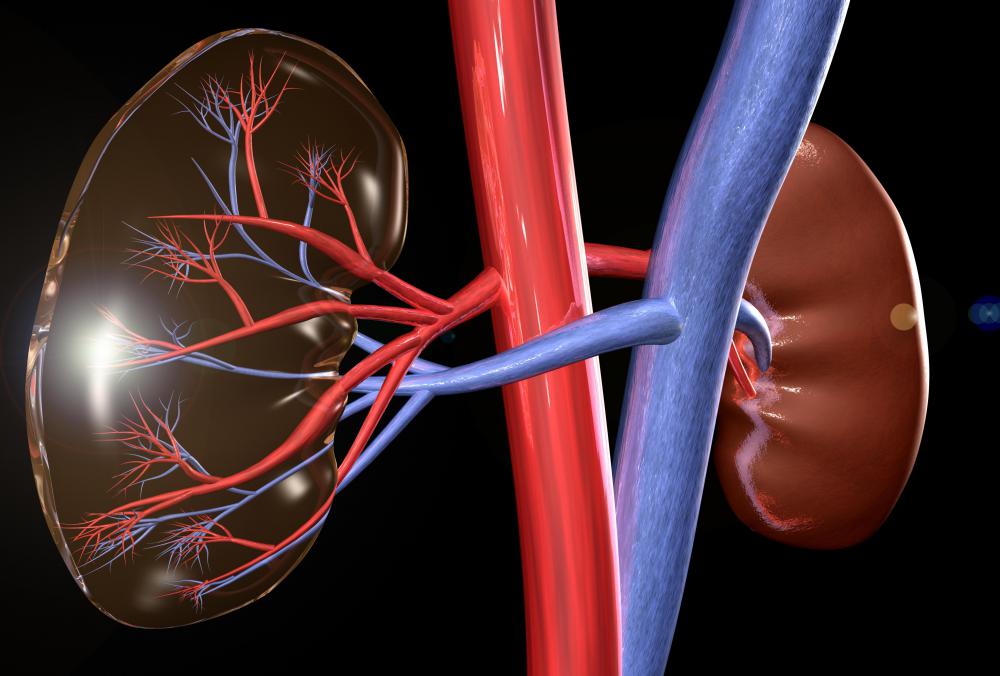At WiseGEEK, we're committed to delivering accurate, trustworthy information. Our expert-authored content is rigorously fact-checked and sourced from credible authorities. Discover how we uphold the highest standards in providing you with reliable knowledge.
What is Pyelonephritis?
Pyelonephritis is infection of the kidney causes by the upward spread of a urinary tract infection. If it is severe, pyelonephritis may also be called urosepsis. The infection results in inflammation of the kidney, or nephritis. It is treated through antibiotics and treatment of underlying causes.
The main symptoms of pyelonephritis are painful urination and pain in the abdomen and lower back, where the kidneys are located. A doctor may tap the back over the kidneys to check whether the patient feels pain, a sign of kidney infection. Other symptoms may include fever, shivering, headaches, nausea, vomiting, and delirium.

Pyelonephritis is diagnosed by urine culture and, if necessary, blood culture. As a preliminary test, a doctor may check a patient's urine for nitrite and leukocytes or white blood cells, as these can indicate infection. If this test is positive, a full urine culture is usually performed. X-rays are necessary to diagnose kidney stones, which may be responsible for the infection. In the case of recurrent pyelonephritis, an ultrasound may be performed to check for polycystic kidneys or vesicoureteral reflux, in which urine flows from the bladder back into the ureter leading to the kidneys.

Most cases of pyelonephritis are caused by bowel bacteria entering the urethra. The condition is more likely to affect those with any medical issues involving the urinary tract or kidneys, including kidney stones, vesicoureteral reflux, catheterization, prostate disease, and pregnancy. Diabetes and immune disorders also increase the risk of developing pyelonephritis. Family history of urinary tract infections, numerous or new sexual partners, and spermicide use are also risk factors.

It is very important to seek treatment as soon as you notice the symptoms of a urinary tract infection in order to prevent pyelonephritis. If you experience painful or frequent urination, along with a feeling of pressure and pain in the pubic area, see a doctor immediately. Blood or pus in the urine can be signs of a more serious condition. A urinary tract infection that has not advanced to the kidneys can typically by cleared up easily with a course of oral antibiotics.

Pyelonephritis is treated with antibiotics, usually intravenously unless the case is mild. If a patient presents with a raised white blood cell count and high fever, he or she may be hospitalized and given intravenous fluids for hydration along with the antibiotics. Patients suffering from recurring pyelonephritis are treated for the underlying cause, if it can be determined. Increased fluid intake, along with cranberry and blueberry juice or supplements and probiotics, can help prevent urinary tract infections.
AS FEATURED ON:
AS FEATURED ON:

















Discussion Comments
Can a doctor tell from a simple urinalysis if someone has a urinary tract infection or pyelonephritis?
I have what seem to be chronic urinary tract infections, and all I have ever done is give a urine sample and take some antibiotics for a week. I just wonder if one urine sample tells them everything they need to know, or if other tests need to be done to find out what is causing so many infections.
A kidney infection is nothing to mess around with. This can be very serious if you let this go too long. My sister ended up being hospitalized because of a pyelonephritis diagnosis.
Oral antibiotics will usually take care of a urinary tract infection, but if it gets out of control and spreads to the kidneys, it can be much more serious. She never did figure out what caused this, and this was the first time she had an infection that was this serious.
She said if she ever got those same symptoms of painful urination, a back ache and a fever, she would make an appointment with her doctor right away.
@Mykol-- I have a history of recurrent urinary tract infections and learned my lesson about not being seen soon enough. Once when I put off going to the doctor I was diagnosed with acute pyelonephritis.
This was really painful and miserable and it wouldn't have been so bad if I had been seen when I first started to have symptoms.
My doctor recommended I try taking some cranberry supplements to see if that might cut down on the number of infections I was getting. She said this was like drinking a lot of cranberry juice. Since I don't like the taste of cranberry juice this sounded like a much better option for me.
I have faithfully been taking these supplements for 4 months, and have not had a urinary tract infection since I started. I don't know if this would work for everybody, but so far it has worked for me.
I have heard that cranberry juice is good for urinary tract infections and wondered if anyone has had good results with this. I get one of these every so often and wonder if I drank some cranberry juice every day if it would make a difference.
My infection has never been severe enough that it spread to the kidneys, but this sounds like it could easily happen if I didn't get it treated.
Post your comments